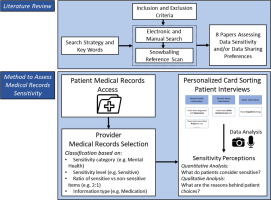当前位置:
X-MOL 学术
›
J. Biomed. Inform.
›
论文详情
Our official English website, www.x-mol.net, welcomes your
feedback! (Note: you will need to create a separate account there.)
State of the art and a mixed-method personalized approach to assess patient perceptions on medical record sharing and sensitivity.
Journal of Biomedical informatics ( IF 4.0 ) Pub Date : 2019-11-11 , DOI: 10.1016/j.jbi.2019.103338 Hiral Soni 1 , Adela Grando 1 , Anita Murcko 1 , Sabrina Diaz 2 , Madhumita Mukundan 1 , Nassim Idouraine 1 , George Karway 1 , Michael Todd 3 , Darwyn Chern 4 , Christy Dye 4 , Mary Jo Whitfield 5
Journal of Biomedical informatics ( IF 4.0 ) Pub Date : 2019-11-11 , DOI: 10.1016/j.jbi.2019.103338 Hiral Soni 1 , Adela Grando 1 , Anita Murcko 1 , Sabrina Diaz 2 , Madhumita Mukundan 1 , Nassim Idouraine 1 , George Karway 1 , Michael Todd 3 , Darwyn Chern 4 , Christy Dye 4 , Mary Jo Whitfield 5
Affiliation

|
OBJECTIVE
Sensitive health information possesses risks, such as stigma and discrimination, when disclosed. Few studies have used a patient's own electronic health records (EHRs) to explore what types of information are considered sensitive andhow such perceptions affect data sharing preferences. After a systematic literature review, we designed and piloted a mixed-method approach that employs an individual's own records to assess content sensitivity and preferences for granular data sharing for care and research.
METHODS
A systematic literature review of methodologies employed to assess data sharing willingness and perceptions on data sensitivity was conducted. A methodology was designed to organize and categorize sensitive health information from EHRs. Patients were asked permission to access their EHRs, including those available through the state's health information exchange. A semi-structured interview script with closed card sorting was designed and personalized to each participant's own EHRs using 30 items from each patient record. This mixed method combines the quantitative outcomes from the card sorting exercises with themes captured from interview audio recording analysis.
RESULTS
Eight publications on patients' perspectives on data sharing and sensitivity were found. Based on our systematic review, the proposed method meets a need to use EHRs to systematize the study of data privacy issues. Twenty-five patients with behavioral health conditions, English and Spanish-speaking, were recruited. On average, participants recognized 82.7% of the 30 items from their own EHRs. Participants considered mental health (76.0%), sexual and reproductive health (75.0%) and alcohol use and alcoholism (50.0%) sensitive information. Participants were willing to share information related to other addictions (100.0%), genetic data (95.8%) and general physical health information (90.5%).
CONCLUSION
The findings indicate diversity in patient views on EHR sensitivity and data sharing preferences and the need for more granular and patient-centered electronic consent mechanisms to accommodate patient needs. More research is needed to validate the generalizability of the proposed methodology.
中文翻译:

采用最先进的混合方法个性化方法来评估患者对医疗记录共享和敏感性的看法。
目标 敏感健康信息一旦披露就会带来风险,例如耻辱和歧视。很少有研究使用患者自己的电子健康记录 (EHR) 来探索哪些类型的信息被视为敏感信息以及这些看法如何影响数据共享偏好。经过系统的文献综述后,我们设计并试行了一种混合方法,该方法利用个人自己的记录来评估内容敏感性和对护理和研究的细粒度数据共享的偏好。方法 对用于评估数据共享意愿和数据敏感性认知的方法进行了系统的文献综述。设计了一种方法来对电子病历中的敏感健康信息进行组织和分类。患者被要求获得访问其电子病历的许可,包括通过州健康信息交换获得的电子病历。使用每份患者记录中的 30 个项目,设计了一个带有封闭式卡片分类的半结构化访谈脚本,并根据每个参与者自己的 EHR 进行个性化。这种混合方法将卡片分类练习的定量结果与采访录音分析捕获的主题结合起来。结果 找到了八份关于患者对数据共享和敏感性观点的出版物。根据我们的系统回顾,所提出的方法满足了使用电子病历系统化数据隐私问题研究的需要。招募了 25 名患有行为健康问题的患者,他们讲英语和西班牙语。平均而言,参与者从自己的 EHR 中认出了 30 个项目中的 82.7%。参与者考虑了心理健康(76.0%)、性健康和生殖健康(75.0%)以及饮酒和酗酒(50.0%)等敏感信息。 参与者愿意分享与其他成瘾相关的信息(100.0%)、遗传数据(95.8%)和一般身体健康信息(90.5%)。结论 研究结果表明,患者对 EHR 敏感性和数据共享偏好的看法存在多样性,并且需要更细粒度和以患者为中心的电子同意机制来满足患者的需求。需要更多的研究来验证所提出的方法的普遍性。
更新日期:2019-11-11
中文翻译:

采用最先进的混合方法个性化方法来评估患者对医疗记录共享和敏感性的看法。
目标 敏感健康信息一旦披露就会带来风险,例如耻辱和歧视。很少有研究使用患者自己的电子健康记录 (EHR) 来探索哪些类型的信息被视为敏感信息以及这些看法如何影响数据共享偏好。经过系统的文献综述后,我们设计并试行了一种混合方法,该方法利用个人自己的记录来评估内容敏感性和对护理和研究的细粒度数据共享的偏好。方法 对用于评估数据共享意愿和数据敏感性认知的方法进行了系统的文献综述。设计了一种方法来对电子病历中的敏感健康信息进行组织和分类。患者被要求获得访问其电子病历的许可,包括通过州健康信息交换获得的电子病历。使用每份患者记录中的 30 个项目,设计了一个带有封闭式卡片分类的半结构化访谈脚本,并根据每个参与者自己的 EHR 进行个性化。这种混合方法将卡片分类练习的定量结果与采访录音分析捕获的主题结合起来。结果 找到了八份关于患者对数据共享和敏感性观点的出版物。根据我们的系统回顾,所提出的方法满足了使用电子病历系统化数据隐私问题研究的需要。招募了 25 名患有行为健康问题的患者,他们讲英语和西班牙语。平均而言,参与者从自己的 EHR 中认出了 30 个项目中的 82.7%。参与者考虑了心理健康(76.0%)、性健康和生殖健康(75.0%)以及饮酒和酗酒(50.0%)等敏感信息。 参与者愿意分享与其他成瘾相关的信息(100.0%)、遗传数据(95.8%)和一般身体健康信息(90.5%)。结论 研究结果表明,患者对 EHR 敏感性和数据共享偏好的看法存在多样性,并且需要更细粒度和以患者为中心的电子同意机制来满足患者的需求。需要更多的研究来验证所提出的方法的普遍性。











































 京公网安备 11010802027423号
京公网安备 11010802027423号